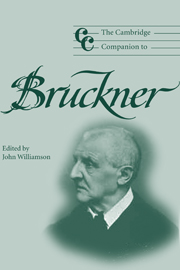5 - Bruckner and the motet
from Part II - Choral music
Published online by Cambridge University Press: 28 September 2011
Summary
Introduction
The majority of Bruckner's smaller sacred works belong to the period in which he was either partly or wholly devoted to the composition of church music – from 1841 in Windhaag until his move to Vienna in 1868. After this, Bruckner was still involved in churchmusic as an organist at the Hofkapelle until October 1892, at the court parish church of St Augustine where he played at two services each month from 1870 to the late 1880s and, occasionally, at other churches in Vienna and its suburbs; but the composition of orchestral music took precedence and sacred works were composed sporadically. Most of these sacred miniatures fall into the category of ‘occasional music’, composed specifically or by demand for church choirs in St. Florian, Linz, and Kremsmünster, but it is a measure of Bruckner's greatness that several of them transcend the limitations of their fairly confined medium and can stand favourable comparison with the three great Masses, the Te Deum and Psalm 150.
The early works (c. 1835–1855)
Bruckner's first faltering attempts at composition were made in the mid-1830s while he was staying with his cousin Johann Baptist Weiss in Hörsching. Weiss gave him organ lessons and some basic instruction in harmony and counterpoint, and the Pange lingua in C major, WAB 31, a setting of St Thomas Aquinas' hymn for unaccompanied four-part choir in a simple homophonic style, is the obvious fruit of this teaching. Bruckner thought highly enough of this early motet to revise it more than fifty years later.
- Type
- Chapter
- Information
- The Cambridge Companion to Bruckner , pp. 54 - 63Publisher: Cambridge University PressPrint publication year: 2004
- 2
- Cited by

